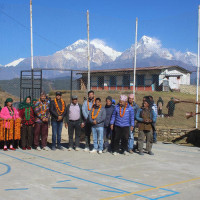- Saturday, 28 December 2024
Threads Of A Dream
The newly installed railing at the back end of PN campus felt icy against Kiran’s palms, but he knew its importance. He was one of the witnesses who had seen a figure falling freely some 100 meters below and landing with a big thud. It was an accident, not a suicide. But who knew what that guy was thinking? What was he going through? Did he fail the exams? Did he intentionally try to make it look like an accident? Kiran couldn’t help but question himself whenever he wandered to the back end of PN campus.
Two years ago, on a rainy summer day, Kiran had walked into PN campus for the first time. With confusion and modest ambition, he had walked along the cemented track leading to the college administration. In his small village of Thumche, where people aspired to become a laure, Kiran was one of a kind—a rare dove in a sky filled with mynahs. A middle-aged man, recently promoted to the post of headmaster, had come to the door of Kiran’s house. It was not a random or ordinary visit. The headmaster wouldn’t just visit people’s homes unless it was something extremely significant. Kiran’s father had emerged with awe plastered on his rugged features, shaken by the unsolicited visit of such a prominent figure. “Please sit here, sir,” the old man had said, pointing to the solitary muda (wooden stool) on the porch. He blew the air on the floor to clear the dust away and then sat in a relaxed manner.
“O Hiley Dai, you don’t seem pleased. It looks like you didn’t harvest as much paddy compared to yesteryears,” the headmaster said, a smile playing on his lips for no apparent reason. Hiley Dai, Kiran’s father, turned around and glanced dejectedly at the towers of straw. "What brings you here, hazur?” the old man asked, trying to get straight to the point.
“Where is your son? Kiran is his name, right?” The headmaster glanced around as if searching for a lost cigarette.
“He must be in the field, watching the cattle and cutting grass. What is he supposed to do anyway? That stupid boy never wanted to become a soldier. His uncles’ sons have all gone to Pokhara to training centers. So, sooner or later, they will go to India and send money to my brothers,” the old man rambled, his tone tinged with disappointment. The headmaster cleared his throat and fished out a pouch of tobacco.
“Look, not everyone has to become a soldier. We are all born with different abilities. It’s not necessary for everyone to have the same interests. Your son is good at studies. Why don’t you make him a teacher? Even our school is always short of good English teachers,” the headmaster said sternly. He didn’t blink for a second, and it made the old man think his suggestion might be worth considering.
The old man had heard plenty of people speak highly of his son’s studies, especially his ease with the English language. When no one in his class ever attempted writing essays on exams, Kiran would write a page or two without stopping to internalise the previous sentence. But Hiley Dai, despite spending most of his life in the village, knew that his son’s proficiency wasn’t extraordinary; it could in no way match the skills honed by city kids.
“He is just a 12th pass. Who will allow him to teach in the school?” The old man’s qualms were obvious, given the cutthroat competition in almost every field, including academics. But as the headmaster got on his feet and moved frantically, shouting the boy’s name, Hiley Dai reckoned this visit had something to do with his son. The old man had to remind the headmaster that Kiran was off to the clearing with the cattle.
Perhaps the young boy who had just passed high school that year was already seen as a candidate for the English teacher in the village’s solitary school. For the old man, who had grown up and lived his life among a group of soldiers, the teaching profession was not only unique but also respectable. Although Hiley Dai had faced caustic remarks throughout his life for not becoming a laure, he secretly wished his son would become someone more significant. That was why the old man didn’t scold his son when he decided he wouldn’t follow in the footsteps of the villagers and his brothers.
“We are looking for a young person who can teach English at the primary level. And after a discussion with other teachers and the school committee, we decided to reach out to your son. Isn’t it amazing that he will start earning at the young age of 19?” The headmaster hadn’t intended to reveal all these details to the old man.
“And how much will he earn? Will he teach those students who are giving the SLC exam this year?” The old man’s face lit up a little as he asked. The headmaster sniggered and inched closer to the old man, as if moving closer would dispel all doubts.
“See, he has only passed 12th this year and is only eligible to teach the kids in junior classes. Most likely, he’ll teach students of the 3rd, 4th, and 5th grades.”
By then, the headmaster had reached the edge of the porch, looking down at the path that led to the big clearing. Slightly irritated by the old man’s questions, he considered leaving. But leaving meant returning the next day, so he decided to wait until Kiran arrived. “And what if my son studies more?” The old man was unstoppable.
“If your son studies more, he might even become a headmaster. He can teach everyone in the school.” And that was that. Two weeks later, something remarkable happened in Kiran’s life. That day, after the headmaster left Kiran’s house, father and son drafted a life-changing plan while the mother cooked gundruk in their stinking kitchen. Kiran wouldn’t join the school as a primary teacher. The old man was willing to give his all if his son agreed to go to Pokhara and complete his bachelor’s degree.
When his father first laid out the plan, Kiran looked slightly perplexed, unsure of the rationale behind it. But what would he do in the village? Almost all his friends were either trying to get into the Indian military or trying their luck in the Gulf. He couldn’t afford to spend his youthful energy dreaming of girls and smoking hookah. It bothered him that he lacked clarity, a vision, and towering ambitions. He didn’t lack the physical attributes to try for the military force, but it never felt like the right path. While almost every youth, including his friends, had started thinking of their future, Kiran just waited and waited. Strangely and luckily, the headmaster’s visit opened both his and his father’s eyes, planting a shared dream.
As Kiran thought of his journey from Thumche to PN campus, his legs weakened and his eyes dampened. The teashop he was in, the cheapest in the area, reminded him of his stature. The creaking furniture and peeling walls spoke volumes about the eatery and its regulars. Yet, when he looked around and spotted humble faces, it calmed him to know there were others like him. Inside the classroom, there were all sorts of students. Some were like him, while others arrived on fancy bikes and glossy cars. Sharing the class with them didn’t bother him, but his failed results chipped away at his confidence.
Trying not to dwell on his results, Kiran entered the teashop, drank a small portion of tea, and readied himself for the first lecture of his third year. As he approached the classroom, the image of him sitting on a round chair in the village’s school floated through his mind. Did he know his classmates’ dreams? Was there a chance anyone else wanted to become a headmaster, like Kiran Magar?
(Gautam is a writer from Pokhara.)















-original-thumb.jpg)

